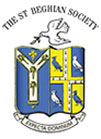|
 |
The Old St Beghian | |
| July 2014 | |||
Peter Lord (G 58-62) writes:
“With reference to OSB Notes Jan 2014 and Michael Anderson's article, I read this with a mixture of fascination and embarrassment. Fascination because I too started life at Meadow House, went on to Grindal and had a great deal of experience of Donald Leggat. Embarrassment, because I do not remember Michael! However, that must be down to my 69 year old memory. Apologies Michael!
I too became a treble chorister, ultimately ending up on the bass line. However, my main claim to fame, so far as Donald was concerned, is that I was one of his piano pupils. He taught me for three years and the weekly lesson at Barony was a fearsome experience. Quite simply I dreaded it, but then I was a slow learner and he, as I am sure would admit, an impatient man (as I probably am now!). Towards the end of the three years, at my request, I moved onto the organ. I barely survived one term before being told I would never make an organist. In fact, I've played the instrument all my adult life and still play for Sunday services locally. He must have taught me far more than either of us realized and I am only sorry I was never able to tell him.
Donald Leggat was indeed an accomplished organist and I believe a FRCO. With a smile on my face now, I also remember a choir visit to Carlisle Cathedral for a Saturday evensong. My role was not to sing, but to pull out the magnificent TUBA stop for the final chord of the voluntary Donald was to play at the end of the service. Not surprisingly he was a realist and gave instructions in case I could not keep up with reading the music. I was instructed to pull out the stop at the 'nod of his head'. As a result I spent the whole service, up in the organ loft trying to remain relaxed, preparing for my star role at the very end! When the time came, Donald proceeded to nod and swing around throughout the final piece of music, demonstrating much 'physical expression' as the true professional he genuinely was. This though, made it quite difficult for me to decide ultimately which was the crucial nod! In fact as we approached the end of the piece, I had to cease trying to follow the music and concentrate just on watching his head. Well, my heart was strong in those days, and despite bringing on the TUBA too early during our one rehearsal, thank goodness I got it right on the night, or rather at the service! My reward was a ride home in the famous red TR2. However I was never one of the privileged few to enjoy tea at Lonsdale Terrace.
Michael also refers to the Priory organ, a particularly famous Willis instrument. With the vicar's kind permission I was allowed to play this quite regularly on Sunday afternoons during my last year at the school. I usually had the building to myself and it was often the highlight of my week. The school had no jurisdiction over the Priory, so although our Director of Music ultimately got wind of my activities and did not approve, he was not able to stop me.
Echoing Michael's closing comments, music has certainly been in my blood for some 60 years. As I struggled away at piano lessons as a youngster, I never imagined it would play such a major role in my life. I have been very fortunate.With regard to my brother Christopher's comments on page 27, although he may have struggled to leave school with six O-Levels, as I did too, he then went on to become a chartered accountant leading to many years as managing director of a large UK manufacturing company.”
Home
The St Beghian Society
St Bees School,
St Bees, Cumbria, CA27 0DS.
Tel: (01946) 828093 Email: osb@st-bees-school.co.uk
Web: www.st-beghian-society.co.uk